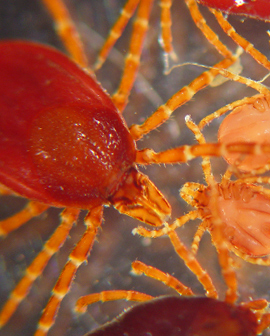Ticks
Ectoparasites are organisms that live on the outside of an animal. Ticks are fairly common ectoparasites of dogs (and cats). How often you see ticks on your dog and how severe a tick assault will be depends on the region of the country  in which you live, the time of year (tick activity varies in warm and cool weather), the habits of your dog, and how and when you use tick control products. Some ticks can infest dogs that spend most of their time indoors, and even dogs that only spend brief periods of time outside can have ticks.
in which you live, the time of year (tick activity varies in warm and cool weather), the habits of your dog, and how and when you use tick control products. Some ticks can infest dogs that spend most of their time indoors, and even dogs that only spend brief periods of time outside can have ticks.
How will ticks affect my dog?
Ticks attach to your dog by inserting their mouthparts into your dog’s skin. Many ticks also produce a sticky, gluelike substance that helps them to remain attached. After attaching to your dog, ticks begin feeding on your dog’s blood. The places where ticks attach can become red and irritated.
Although rare, ticks can consume enough of your dog’s blood to cause a deficiency called anemia. Certain female ticks can also cause a rare paralysis in dogs as a result of a toxin they produce while feeding. More important, ticks are capable of causing many diseases in your pet. The disease with which most people are familiar is called Lyme disease. Another is Rocky Mountain spotted fever.
Lyme disease can cause arthritis and swelling of your dog’s joints, resulting in painful lameness. Rocky Mountain spotted fever can cause fever, lameness, and other signs. There are also other diseases that ticks can transmit to your dog. Your veterinarian can answer questions about the diseases that are important where you live. View forecasts for Lyme Disease, Ehrlichiosis and Anaplasmosis in your local area at https://petdiseasealerts.org.
How do I prevent my dog from getting ticks?
It is very difficult to prevent your dog’s exposure to ticks. Ticks can attach to your dog when he or she goes with you on walks, hikes, or during any outdoor activities.
The best way to prevent ticks from attaching to your dog is by the regular use of tick control products. Your veterinarian can advise you about the best product for your dog and your situation. Your veterinarian is also aware of diseases that are common in your area and can pose a risk to your dog.
If you have a tick problem in your yard consider:
- treating the outdoor environment (be sure to understand what products you are using and how they affect the environment)
- making a landscape change to make the environment less tick friendly – this can be done by providing a 3 foot buffer between the lawn and any woods. Mulch, wood chips, or gravel work well, and help to decrease the migration of ticks into yards.
- ridding your yard of wild animals
Often more ticks are present or they are more active at certain times of the year. Your veterinarian can tell you how to avoid locations where large numbers of ticks are found.
Can humans be harmed by ticks?
Ticks can attach to and feed on humans. The skin where ticks attach to humans can become red and irritated. Ticks that transmit diseases to your dog can also transmit many of the same diseases to people. It is important to realize that people do not get these diseases from their dogs. Both people and dogs get the diseases from ticks they come into contact with outdoors. Diseases, such as Lyme disease and Rocky Mountain spotted fever, which have already been described in dogs, can also be very serious in humans.
If you have questions about human diseases that are transmitted by ticks and how you can protect yourself, you should consult a doctor.
For veterinary professionals, more detailed information on ticks can be found at https://www.capcvet.org/guidelines/ticks/.
Did you know?
- While ticks themselves cause only mild irritation, they can carry diseases that pose a serious threat to animals and humans.
- Ticks can be prevented by regular use of tick control products.
- Just pulling off a tick can leave body parts attached to your dog. Ask your veterinarian about proper tick removal and tick control.
- Illnesses transmitted by ticks can case fever, anemia, paralysis, lameness, and other symptoms.
- People can not catch Lyme disease or Rocky Mountain spotted fever from infected dogs, but the same ticks that bite dogs can cause these illnesses and others if they bite humans.
- Adult ticks can live up to 3 years without blood meal.
- Ticks live on three different animals during their life.
- Most ticks spend most of their life OFF the host (animal) in the environment.
- Ticks can't jump and don't "fall from trees" as most people think, but transfer onto hosts when animals or humans walk through long grass, bushes and brush.
- Overview
- Coccidia
- Ear Mites
- Fleas
- Giardia
- Heartworms
- Hookworms
- Mange
- Roundworms
- Scabies
- Tapeworms
- Ticks
- Whipworms
Ask Your Veterinarian
Ticks can cause anemia as well as carrying many diseases. If you live in an area with ticks, speak with your veterinarian about medication that helps prevent ticks from attaching to your pet and kills any that do. Your veterinarian can also show you the safe way to remove ticks without breaking off the head and leaving some of the tick attached to your pet.

